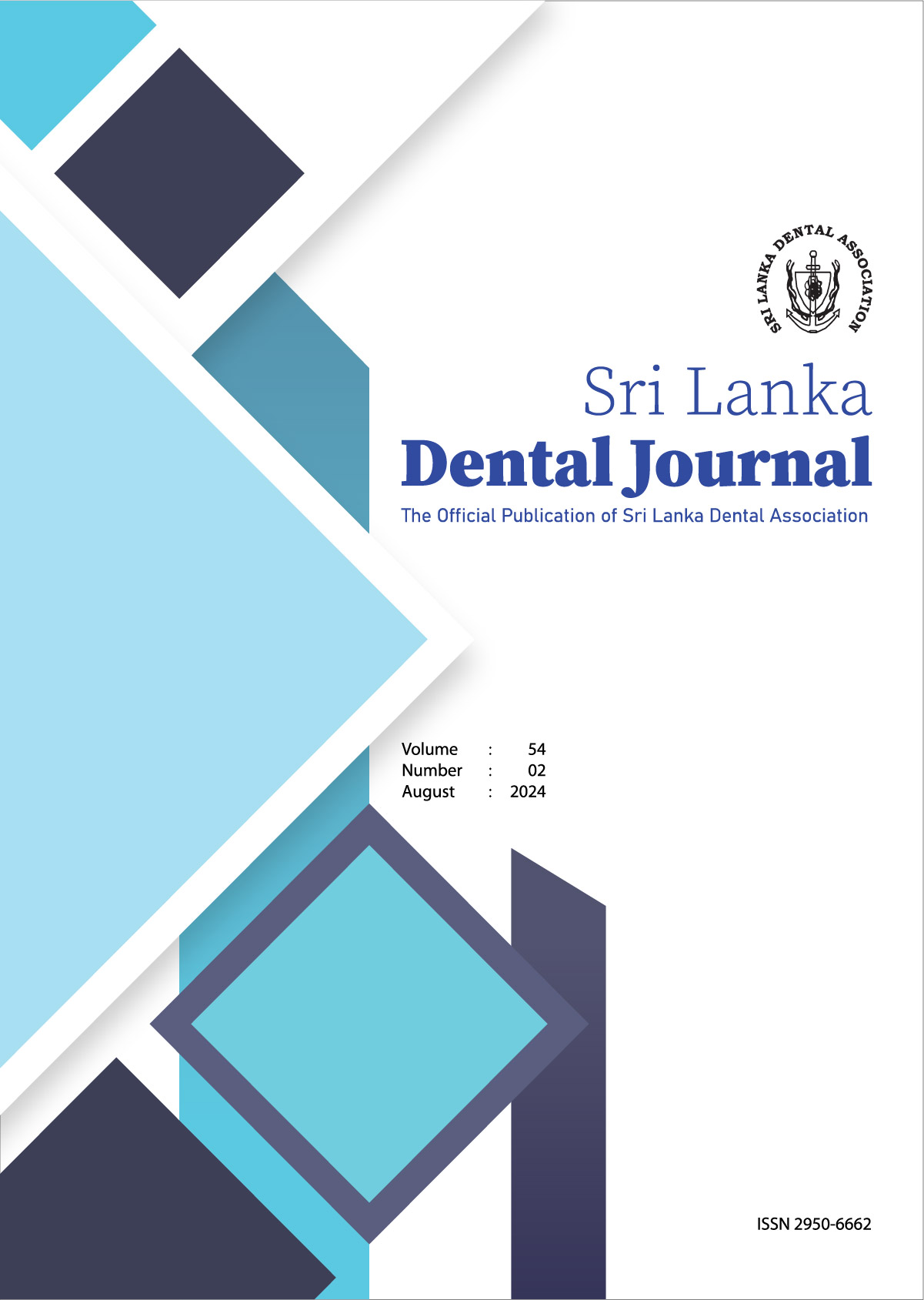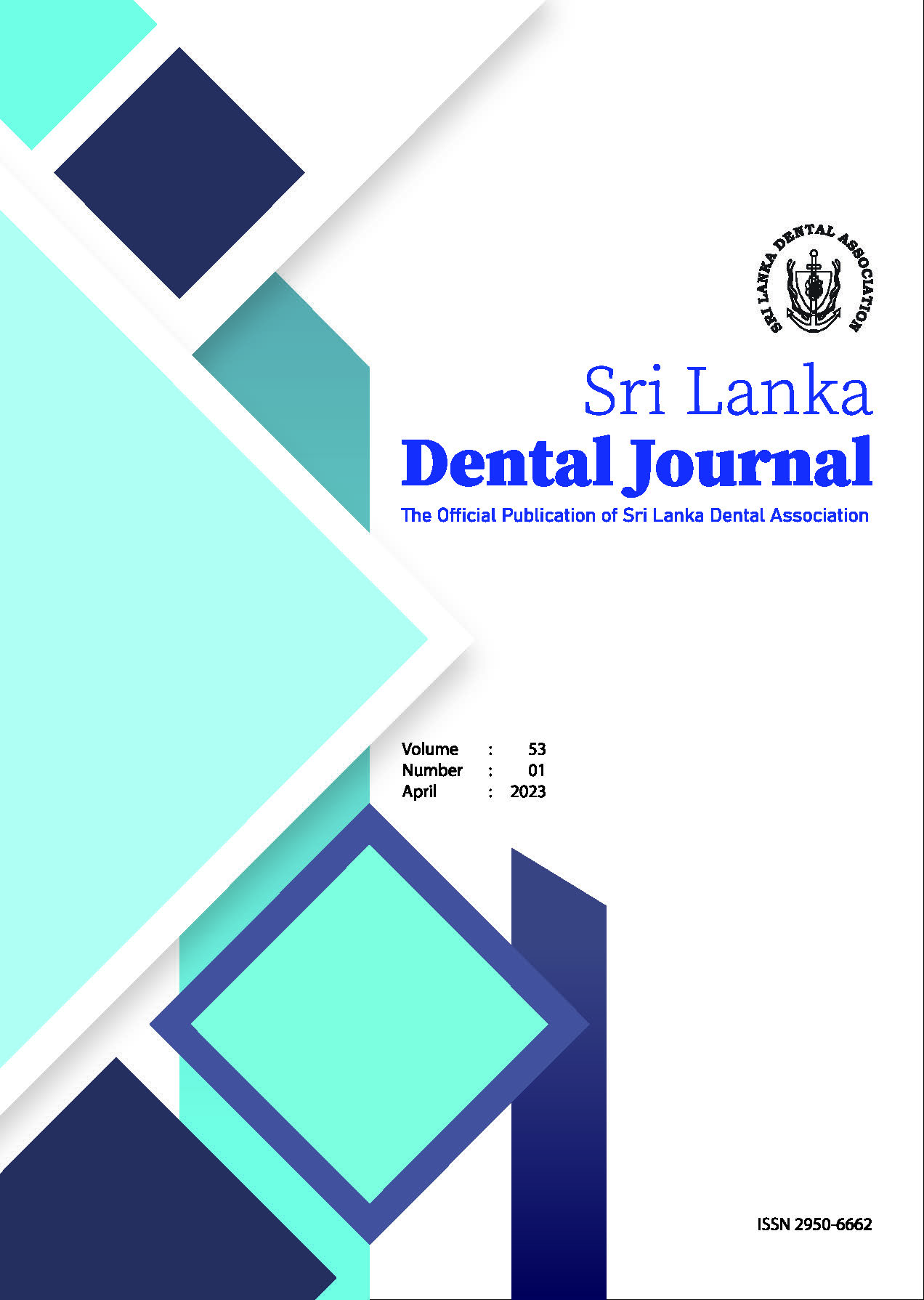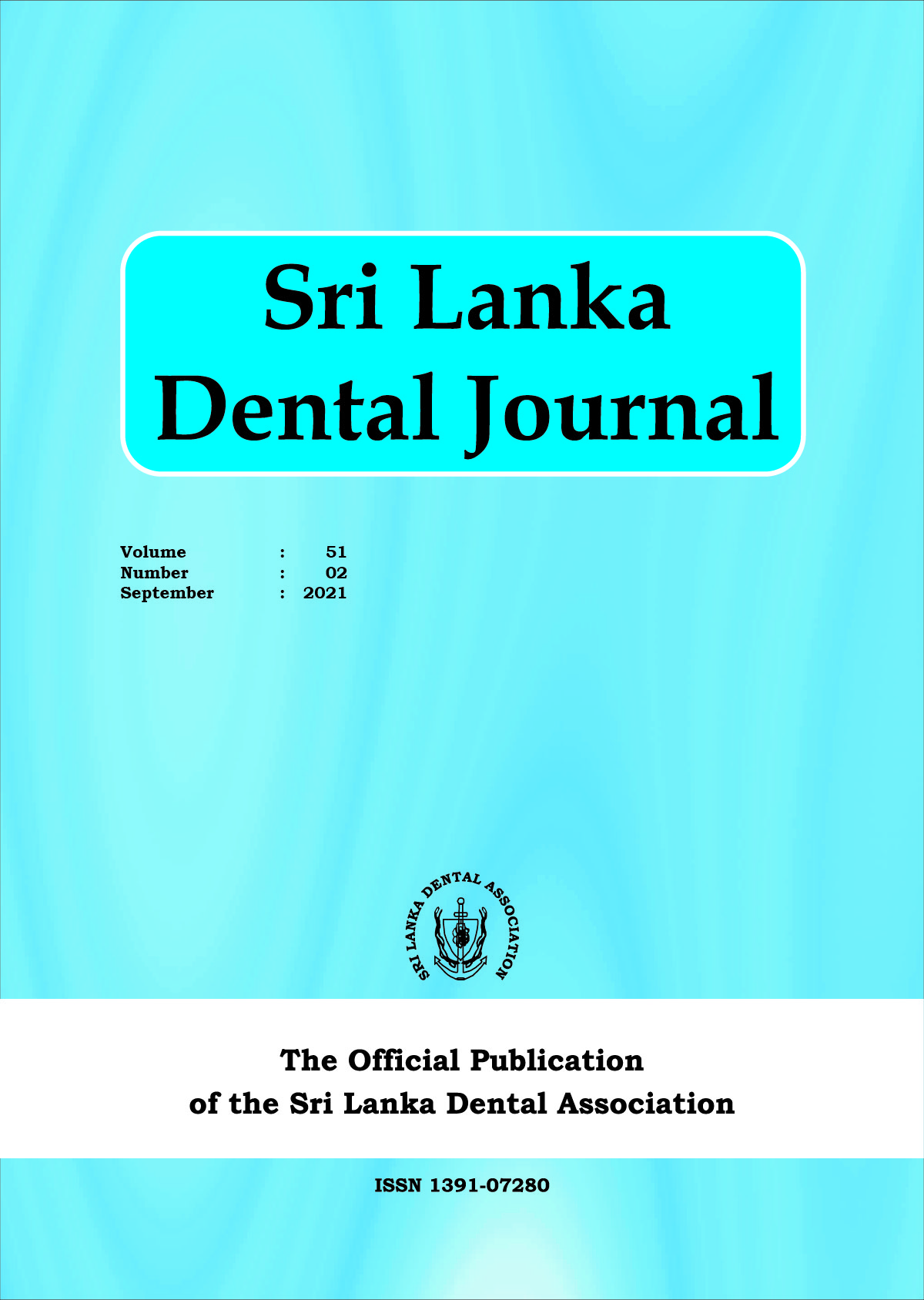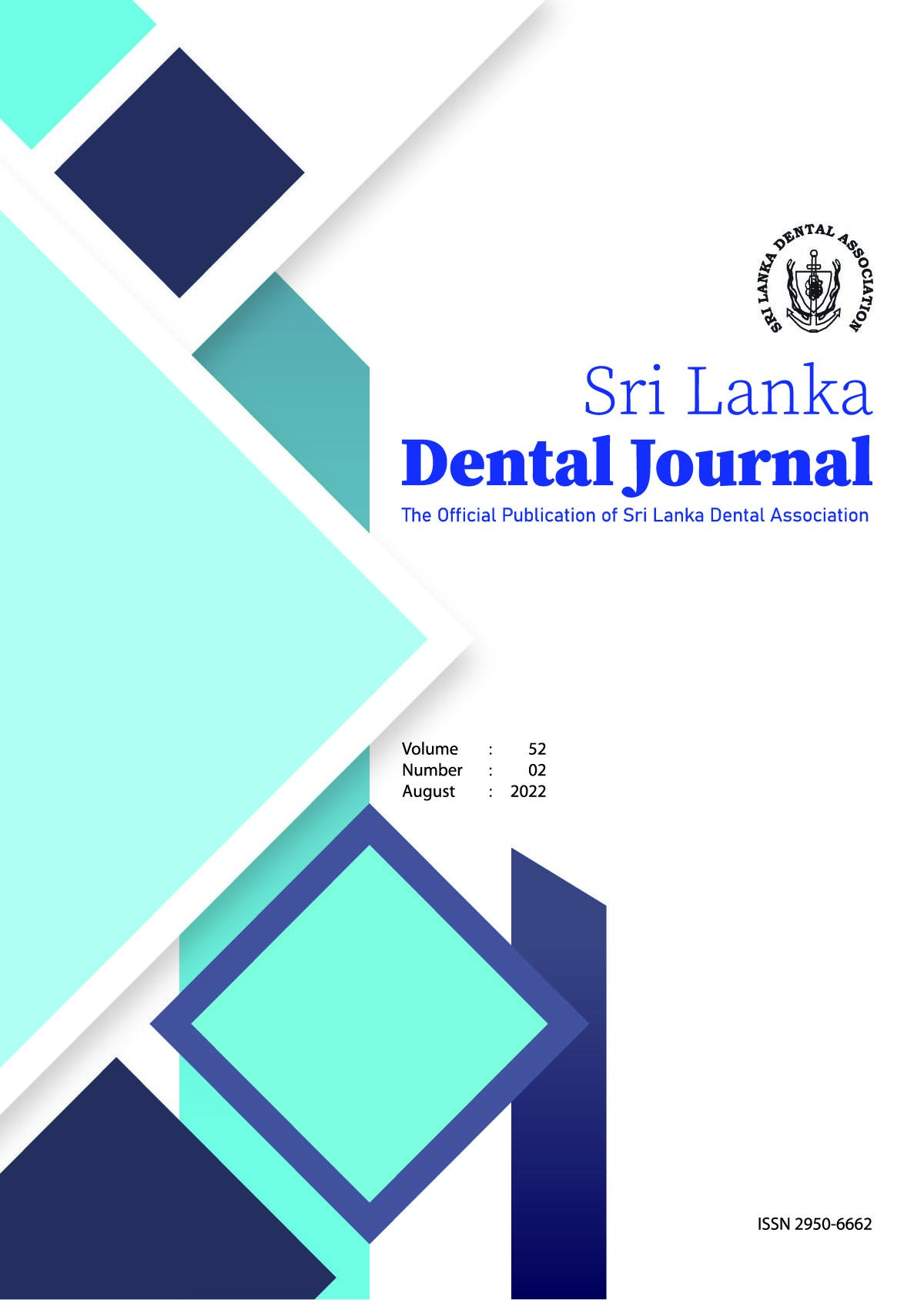Sri Lanka Dental Journal

Current Issue 2024
Sri Lanka Dental Journal
Volume 54 Number 02
August 2024

Past Issues
Sri Lanka Dental Journal
Past Issues 2024 - 1964
Volume 54 - 01
- About Journal
- Editorial board
- Editorial policies
- Research Integrity
- Submission Guidelines
- Manuscript Submission
The Journal
Sri Lanka Dental Journal (SLDJ) is the official journal of the Sri Lanka Dental Association (SLDA) with its first issue was published in 1970. SLDA is an open-access, peer-reviewed journal, which is published triennially (Three issues per year) from 1970. It publishes original research articles, reviews, brief reports, updates and short communications to inform current research, policies, and evidence based public health practices in all areas that are of common interest to public health practitioners, clinicians, and health policymakers.
The journal provides an interdisciplinary forum for the dissemination of research material in a variety of disciplines relevant to public health such as demography, epidemiology, statistics, communicable and non-communicable diseases, health systems and policy, health service management, and health economics.
The mission of the SLDJ is to encourage, empower and stimulate researchers and health professionals to publish high-quality research, which is novel and of public health importance in the local and global context.
ISSN 1391-07280
Open access
SLDJ provides open access to its contents immediately upon publication, without any subscription charge or registration fee, on the principle that making research freely available to the public supports a greater global exchange of knowledge.
Article processing charges
SLDJ does not charge any article-processing or publishing fee.
Indexing services
All articles published in the SLDJ are deposited with Crossref.
Editorial policies
SLDJ follows a double-blind peer-review process, in which each article is reviewed by two independent reviewers (names of the authors are not revealed to the reviewers and vice versa until the initial decision is made on the manuscript). The review will focus on the originality of the work, the scientific validity of the study and its findings, ethical conduct, and oral health implications. Reviewers comprise members of the Editorial Board including the members of the International Advisory Board, and local or international experts on specific content/field if required.
The two co-Editors are in charge of the peer-review process. Corresponding authors are requested to submit the manuscripts online using the Editorial Manager system (for more information, visit Submission Guidelines). When a manuscript is submitted to the SLDJ, it is initially assessed by the co-Editors on meeting the criteria for submission. If it does, the co-Editors will select two potential reviewers within the field of research and invite them to review independently and make recommendations in reviewers’ reports within two weeks of accepting the invitation to review. The editorial board will be meeting once a month (every third Thursday of the month), during which the recommendations made by the reviewers will be presented further, discussed, and finally, a decision will be made on the manuscript. Accordingly, the peer-review process until the first decision will usually take 2-6 weeks from the date of submission. Decisions include: ‘Rejection; no further review’ (Decline to publish), ‘Major revision’ (Resubmit for review), ‘Minor revision’ (Revision required), and ‘Accept’ (No further revisions)’.
If it is a re-submission, comments will be communicated to the corresponding author within one week of the meeting. Once received, the manuscript should be revised, while taking the reviewer’s comments into account. The revised manuscript is to be submitted online by the corresponding author within the next 4 weeks if it is a ’Major revision’, and within the next 2 weeks if it is a ‘Minor revision’. It should include a covering letter detailing the responses given to each reviewer comment in point-by-point form and be submitted online by the given deadline. The final decision will be made accordingly and communicated to the corresponding author. If the corresponding the author does not respond to three reminders sent by the Editorial Office after the deadline, the manuscript will be automatically removed from the system and will not be considered for further evaluation.
Peer review policy
SLDJ ensures that international standards of publication of biomedical research are maintained. Before submission, all authors should read and agree on the contents of the manuscript, and conform to the editorial policies given below.
- Ethics approval
- Consent to participate
- Research involving animals
- Consent for publication
- Registration of Trials and Systematic Reviews
- Standards of reporting
- Competing interests
- Authorship
- Acknowledgments
- Duplicate publication, published abstracts/posters, and text recycling
- Peer review
- Confidentiality
- Misconduct
- Plagiarism
Archiving Policy
SLDA is available for LOCKSS harvesting, to create a distributed archiving system among participating libraries and permits those libraries to create permanent archives of the journal for purposes of preservation and restoration.
Citing articles in SLDA
Articles in SLDA should be cited as: Authors. Title. SLDA year; volume[issue]: pages. DOI
Example: Mahesh PKB, Gunathunga MW, Arnold SM. Home-based temperature measuring practices and their association with selected events of disease sequelae among children treated as dengue in a tertiary care setting in Sri Lanka. Journal of the Sri Lanka Dental Association 2017; 22(1): 30–38. DOI: http://doi.org/10.4038/slda.v22i1.8084
Speed of publication
The SLDJ is committed to offering a fast publication procedure while adhering to the editorial and peer review policies of the journal. All articles considered for publication in the Journal are submitted online and will undergo the specified peer-review process. The Editorial Board aims to convey the first decision on the article within 2-6 weeks of its initial submission. After acceptance, articles will be published as a formatted PDF.
Copyright
Copyright of articles in the SLDA is retained by the author(s). The authors grant the Sri Lanka Dental Association a licence to publish the article and to identify itself as the original publisher. The SLDA is published under the Creative Commons Attribution License 4.0. This licence permits use, distribution and reproduction in any medium, provided the original work is properly cited. Authors are free to deposit their articles in an institutional repository.
Sri Lanka Dental Journal – 2025 – 2027
Editors | Assistant Editors |
Dhanushka Leuke Bandara | Hemantha Amarasinghe |
Nilantha Ratnayake | Primali Jayasooriya |
Ruwan Jayasinghe |
Editorial Board
- Amirthavarshini Rajaganesh
- Ananda Rathnayaka
- Aruni Pradeepika
- Kapila Arambawatta
- Kehinde Kanmodi
- Lilani Ekanayake
- Manori Jayasinghe
- Rasika Ekanayake
- Sumedha Jayathilake
- Sumith Loku Pathirage
- Suresh Shanmuganathan
Ethics approval
When submitting research involving human subjects, human material or human data, authors should ensure that it has been performed in accordance with high ethical standards, and has been approved by an appropriate Ethics Review Committee. Manuscripts of such research should include a statement on ‘Ethics approval’ under ‘Author Declarations’ detailing the name of the Ethics Review Committee that approved the study and where appropriate, the reference number.
If the study was granted an exemption from requiring ethics approval, it should be mentioned in the manuscript along with the name of the Ethics Review Committee. Failure to do so will lead to such manuscripts not being considered for peer review. Irrespective of the approval by an Ethics Review Committee, the manuscript may be rejected if the Editorial Board considers that the research has not been carried out based on ethical principles. In exceptional circumstances, the Editors may contact the Ethics Review Committee for clarifications.
Consent to participate
Informed consent to participate in the study should be obtained from all participants (or from parent or legal guardian in the case of children under 18 or from legal guardian in the case of mentally or physically incapacitated persons) in all research involving human subjects. A statement to this effect should appear in the manuscript on ‘Ethics approval’ under ‘Author Declarations’.
Research involving animals
When research involving animals is submitted, authors should ensure that it has been performed in accordance with institutional, national or international guidelines. A statement detailing compliance with relevant ethical standards and ethics approval (including the name of the Ethics Review Committee and the reference number) should be stated in the manuscript on ‘Ethics approval’ under ‘Author Declarations’.
If the study has been granted an exemption from requiring ethics approval, it should be mentioned in the manuscript along with the name of the Ethics Review Committee. The Editorial Board may reject a manuscript on account of animal welfare issues or conducting research inconsistent with commonly accepted norms of animal research.
Consent for publication
If the manuscript includes details or images relating to individual participants, written informed consent for publication of such images should be obtained from the participants (or from parent or legal guardian in the case of children under 18 or from legal guardian in the case of mentally or physically incapacitated persons). A statement to this effect should appear in the manuscript on ‘Ethics approval’ under ‘Author Declarations’. If the participant has died, consent for publication should be sought from his/her next of kin.
If requested, the documentation on written informed consent should be made available to the Editor and will be treated confidentially. Where images are entirely unidentifiable and no details on individuals are reported in the manuscript, consent for publication of images is not required.
Registration of trials and systematic reviews
All clinical trials that are reported in submitted manuscripts are required to be registered in the Sri Lanka Clinical Trials Registry or any other internationally or regionally accepted clinical trials registry. The trial registration number and the date of registration should be included at the end of the manuscript abstract.
Standards of reporting
When preparing the manuscript, authors are strongly recommended to refer to the minimum reporting guidelines for health research, in order to ensue complete and transparent reporting of biomedical research. Given below are some of the checklists used for reporting different study designs:
- Randomized controlled trials (CONSORT) and protocols (SPIRIT)
- Systematic reviews and meta-analyses* (PRISMA) and protocols (PRISMA-P)
- Observational studies (STROBE)
- Case reports (CARE)
- Qualitative research (COREQ)
- Diagnostic/prognostic studies (STARD and TRIPOD)
- Economic evaluations (CHEERS)
- Pre-clinical animal studies (ARRIVE)
Competing interests
Each author enlisted in the manuscript should declare both financial and non-financial competing interests in relation to the work given in the manuscript. The manuscript should include a statement on ‘Competing interests’ under ‘Author Declarations’. If none of the authors has any competing interests, the statement should read as “The author(s) declare(s) that they have (he/she has) no competing interests”.
Authorship
Individual contribution of each author should be stated in the manuscript on ‘Author contributions’ under ‘Author Declarations’ to give appropriate credit to each.
According to the International Committee of Medical Journal Editors (ICMJE) guidelines, one is qualified as an ‘author’ if he/she has:
- made substantial contributions to conception and design, or acquisition of data, or analysis and interpretation of data;
- been involved in drafting the manuscript or revising it critically for important intellectual content;
- given final approval of the version to be published. Each author should have participated sufficiently in the work to take public responsibility for appropriate portions of the content; and
- agreed to be accountable for all aspects of the work in ensuring that questions related to the accuracy or integrity of any part of the work are appropriately investigated and resolved.
Please note that funding of the research or acquisition of funds, collection of data or general supervision of the research alone, does not justify for authorship.
Acknowledgements
Any contributor who does not meet the criteria for authorship but deserves an acknowledgement can be listed in the manuscript on ‘Acknowledgement’ under ‘Author Declarations’.
Duplicate publication
Any manuscript submitted to the SLDA should be original. Manuscripts submitted for publication in SLDA should not be submitted for publication elsewhere. Also, the entire manuscript or substantial part of it should not have been published before in any journal or in other citable form, or not under review by another journal at the time of submission.
If there is any duplication, the authors should declare this information when the manuscript is submitted. If requested, work cited as ‘in press’ or ‘unpublished’ should be made available if the Editors consider these as relevant to the evaluation of the submitted manuscript.
Published abstracts/ posters
Oral and poster presentations published as proceedings of academic meetings do not preclude consideration for peer review of a full manuscript, provided that the full manuscript represents a formal advance to the citable abstract or poster.
Text recycling
Replication of text from their own previous publications is considered as text recycling. If such duplication is necessary or unavoidable, this should be transparently reported in accordance with copyright requirements of previous publications. In addition, at the time of manuscript submission, the authors should declare this to the Editor.
Peer-review
The SLDA follows a double-blind peer review process. For more information, visit: About SLDA.
If the Editor is in the author list of the manuscript or has any other competing interest regarding the particular manuscript, another member of the Editorial Board will be assigned to assume responsibility to follow the peer review process.
Authors may request exclusion of individuals as peer reviewers, but they should explain the reasons for exclusion in their cover letter on submission of the manuscript.
Confidentiality
All manuscripts submitted to the SLDA will be treated confidential by the Editorial Board and reviewers. Following the initial review, if the Editorial Board is of the opinion that a better review could be undertaken by an expert in the relevant field locally or internationally, it will be forwarded to such a person to be reviewed independently or jointly with the first reviewer.
Misconduct
Allegations of potential misconduct are treated seriously. In cases of suspected misconduct in research or publication, it may be necessary to contact and share manuscripts and other details with third parties, for example, Ethics Review Committee(s) and head(s) of the institution(s) to which author(s) are affiliated. In the case of research misconduct being proven retrospectively (i.e. post-publication), articles may be retracted.
If manipulation is suspected on data or images submitted, the author may be asked to submit the original data sets or the original image for comparison. If the author(s) fail to disprove any such manipulation, Editorial Board may decide to reject the manuscript.
Plagiarism
The SLDA treats plagiarism seriously and uses plagiarism detection software to detect it. If it is detected, COPE guidelines on plagiarism will be followed: (http://publicationethics.org/files/u2/02A_Plagiarism_Submitted.pdf)
Before submission,
- You must read carefully the section on Author Guidelines and prepare your manuscript accordingly.
- Your manuscript should be accompanied by a cover letter with the following declarations:
- The manuscript has not been published elsewhere nor submitted to another Journal for consideration for publication.
Author Guidelines for the Sri Lanka Dental Journal (SLDJ) [Click to Download]
1. Scope and Focus
The Sri Lanka Dental Journal (SLDJ) publishes original research, reviews, clinical updates, case reports and short reports in the field of dentistry and related sciences. Submissions should contribute to advancing dental knowledge, improving clinical practice, addressing educational needs, or exploring emerging trends in oral health. Articles from interdisciplinary perspectives and allied sciences that influence dentistry are also welcomed. All submissions must adhere to ethical research standards.
2. Article Types
2.1 Leading Articles:
Maximum 2,500 words, excluding abstract and references, and up to 20 references. These articles provide expert perspectives, critical analysis, or commentary on current topics in dentistry and allied sciences. They may include discussions on policy, education, or significant advancements in the field. Leading articles are typically commissioned, but unsolicited submissions may be considered at the discretion of the editors.
2.2 Review Articles / Clinical Updates:
These articles provide systematic and substantial coverage of a research or clinical area of wide interest. They may present a critical assessment of a specific topic or compile recent insights in dentistry and related fields. The article must focus on recent research, be timely and relevant and provide comprehensive analysis. No word or reference limits.
2.3 Research Articles:
These articles report original research that contributes new knowledge to the field of dentistry and oral health sciences. Studies may include clinical trials, epidemiological research, in-vitro studies, health economics and applied basic science research. Results from routine clinical examinations or laboratory investigations without a clear research hypothesis or significant findings will not be considered. No word or reference limits.
2.4 Short Reports:
These include reports on current topics, modified techniques, new materials and practice management. Interesting results from routine clinical work or laboratory investigations may also be accepted. They should not exceed 1,500 words (excluding the abstract and references) and 10 references.
2.5 Case Reports:
These reports highlight rare diseases, conditions, novel treatment modifications, or innovative management methods. They should contribute to existing knowledge, provide educational value, or emphasize necessary changes in clinical practice, diagnosis, or prognosis. Maximum 2,000 words, excluding abstract and references, and up to 15 references.
2.6 Letters to the Editor:
These letters provide a platform for scholarly discussion, critique of published papers, or professional commentary on issues relevant to dentistry. Subjects are unlimited but must maintain academic rigor. Maximum 1,000 words, no references.
2.7 Proceedings of Annual Sessions:
This section publishes abstracts from annual sessions of SLDA, other dental colleges and professional associations related to dentistry. Abstracts must be submitted upon request by the respective associations and follow the standard format set by SLDJ.
3. Manuscript Submission Proces
- Access the SLDA website on https://journal.slda.lk/. Open the Manuscript submission tab.
- Fill the details and attached the files accordingly.
- Please make sure the Tables/Figures/supplementary documents are submitted separately.
- All tables and figures should be numbered consecutively and must be quoted in the main manuscript where appropriate.
- Submission implies that no part has been published before, nor is it under consideration elsewhere.
- Authors agree to assign copyright to SLDJ upon acceptance.
4. Manuscript Preparation Guidelines
- Manuscripts that are not submitted in proper format may be returned without review.
4.1 General Formatting:
● Language: Manuscripts must be written in English (British spellings).
● File Format: Submit manuscripts in Microsoft Word (.doc or .docx).
● Font and Layout: Use Times New Roman, size 12, double-spaced, in single column
● Size: on A4 (2I2x297 mm) paper
● Margins: 1-inch on all sides.
● All measurements must be given in SI units. Correct unit abbreviations should be used.
● All abbreviations should be defined in the text at first use.
4.2 Manuscript Structure:
The manuscript should be prepared in the form of a single file containing the following items arranged in the order shown: Title page, Abstract, Main text, Acknowledgements, References, Figures & legends, Tables & legends.
4.2.1 Title Page:
○ Title (concise and descriptive).
○ Authors’ full names and institutional affiliations.
○ Corresponding author’s email address and the phone number.
○ ORCID IDs for all authors (optional but encouraged).
4.2.2 Abstract:
○ The abstract should be a structured summary of the manuscript, providing a concise
overview of the study.
○ It must not exceed 250 words and should be clear and informative, allowing readers
to quickly grasp the key findings.
○ Avoid using abbreviations and references.
○ The abstracts for research articles should be prepared under the following specified
subtitles:
- Objective: Clearly state the purpose of the study, including the research question or hypothesis.
- Materials and Methods: Summarize the study design, population/sample, procedures and statistical analysis used.
- Results: Provide a concise summary of key findings, ensuring statistical significance where applicable.
- Conclusion: Highlight the study’s main conclusion and its implications for dental practice, research, or policy.
4.2.3 Keywords:
○ Provide 3-5 relevant keywords.
4.2.4 Main Text (structured as per article type):
○ Original Research: Introduction, Materials and Methods, Results, Discussion, Conclusion.
○ Case Reports: Introduction, Case Presentation, Discussion, Conclusion.
○ Review Articles: Introduction, Subheadings as necessary, Conclusion.
Introduction
- Provide adequate background information on the study’s subject area.
- Clearly state the research problem, objectives and significance of the study.
- Avoid an extensive literature review; focus on relevant references that justify the study.
Materials and Methods
- Describe the study design, data collection and analytical methods in sufficient detail for reproducibility.
- Use subheadings where necessary to enhance clarity.
- Ethical considerations must be explicitly stated, including ethical clearance details and adherence to guidelines such as the Declaration of Helsinki (latest version).
- For clinical trials, registration details should be provided.
Results
- Present findings clearly and concisely without interpretation.
- Use appropriate tables, figures and statistical analyses to support the data.
- Use subheadings where necessary for clarity.
Statistical Analysis
- Ensure all statistical methods are described adequately.
- If applicable, statistical consultation is recommended.
- Include confidence intervals and p-values where appropriate.
Discussion
- Interpret and contextualize findings with relevant literature.
- Highlight the study’s contributions, limitations and future research directions.
- Avoid excessive repetition of results.
Conclusion
- Clearly state the key findings and their implications for research, clinical practice, or policy.
- Keep conclusions concise and evidence-based.
Acknowledgments:
- Recognize funding sources and contributions that do not meet authorship criteria.
- Disclose any conflicts of interest related to the study.
References:
- Vancouver style, numbered consecutively in the text.
- Ensure that all cited works are included in the reference list.
Tables and Figures:
- Include tables and figures as separate files. Submit with the supplementary files.
- Indicate placement in the manuscript (e.g., “Insert Table 1 here”).
- Figures must be in JPEG or TIFF format with a resolution of 300 dpi.
5. Ethical Requirements
- All research involving human participants must include a statement of ethical approval from an accredited ethics review committee. Where applicable, a copy of the ethical clearance certificate should be attached.
- Clinical trials must include the trial registration number.
- A signed informed consent form must be obtained from all participants or their guardians.
6. Peer Review Process
- All manuscripts will undergo a double-blind peer review process.
- The initial decision on the manuscript will be communicated to the corresponding author within 2-6 weeks.
- The Editorial Board may suggest revisions to authors, according to the recommendations made by the reviewers and ask for a new evaluation of the revised paper in order to make the final decision on its publication.
- Authors are fully responsible for the contents in published manuscripts.
7. Plagiarism Policy
- All submissions are subject to plagiarism checks. Manuscripts with significant overlap with previously published work will be rejected.
8. Copyright and Licensing
- Upon acceptance, authors must sign a copyright transfer agreement.
- Articles are published under a Creative Commons Attribution License (CC BY 4.0), allowing for sharing and adaptation with proper attribution.
9. Conflict of Interest Disclosure
- Authors must disclose any potential conflicts of interest.
- Include a statement on funding and sponsorship.
10. Contact Informatio
For any queries regarding submissions or manuscript preparation, contact:
Email: contact@slda.lk
Or through mobile, contact Journal editors:
Dr N Ratnayake +94714317312
Dr D Leuke Bandara +94777279486




